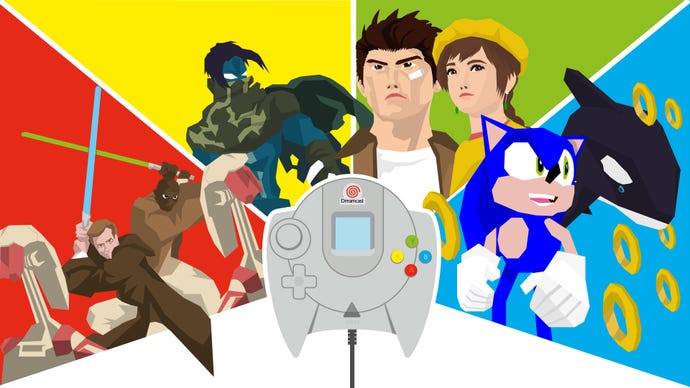Amy Hennig, Hideaki Itsuno, and Other Developers Share Their Favorite Dreamcast Games, 20 Years Later
For the Dreamcast's 20th anniversary in North America, we asked game developers about their favorite games from Sega's short-lived console.
This article first appeared on USgamer, a partner publication of VG247. Some content, such as this article, has been migrated to VG247 for posterity after USgamer's closure - but it has not been edited or further vetted by the VG247 team.
Today, the Sega Dreamcast turns 20 in North America. It was a console that was ahead of its time, and embraced the weird. You could cruise around a faux-San Francisco as a frenetic taxi driver, roll around at the speed of sound, or escape the police while graffiting with style in just a disc change. The Dreamcast not only housed cult favorites, it forged its own path forward in the realm of 3D animation before being eclipsed by the PlayStation 2.
The PS2, and later original Xbox, buried the Dreamcast. It became Sega's swan song in the field of consoles. The Dreamcast's spirit lived on in the latter for a time—especially with games like Jet Set Radio Future and Panzer Dragoon Orta. Sega continues to make games, too, of course. But Sega's own console dreams were dead following the failure of the Dreamcast.
Its legacy lives on though. For the Dreamcast's 20th anniversary, we surveyed game developers across the industry all year long, asking those we met what their favorite Dreamcast game is, and why. Some tell us heartwarming stories about Dreamcast games they themselves worked on, while others pick out niche favorites—some we even had to Google ourselves to see if they existed. And that's really the legacy of the Dreamcast: with so many games and so many odd corners occupied, everyone has a fond memory of it.
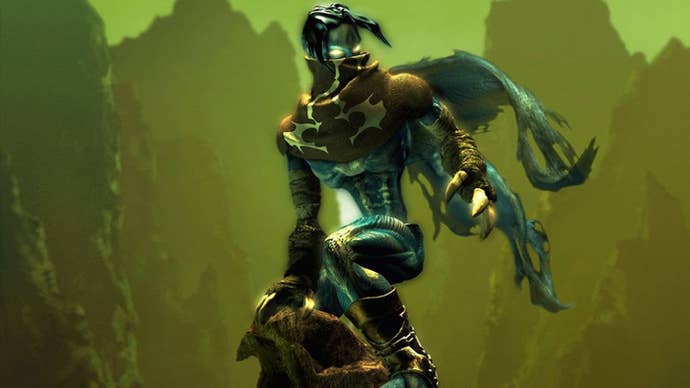
Amy Hennig, writer and director on Uncharted 1-3, Soul Reaver series
Well, this is going to be completely self-serving. My favorite Dreamcast game is actually Soul Reaver on the Dreamcast because that relief. I mean, we were so proud that we got it onto that machine and it was a better game on that machine. Not that many people got to see it, but it was like a more complete realization of what we were trying to do. And a lot of people still kind of callback to that. And, you know, I wish we had made more and wish the Dreamcast had continued.
Hideaki Itsuno, director of Devil May Cry 5, Dragon's Dogma
I love all the titles on Dreamcast, so it's really hard to choose one. I just have a huge love for that console in general. If I had to pick one title, I'm not sure if it was released in North America, but it was called Guruguru Onsen. You are able to play Mahjong locally. What would happen was I was newlywed at the time, and so me and my wife would play Mahjong on Dreamcast, and the person who lost would typically have to do the dishes. Then, on top of that, just from a development standpoint, it was one of the first platforms where we did competitive online specs. There's just a love of positive things I associate with that platform.
Junichi Masuda, producer of Pokemon series
What left the most impression for me on the Dreamcast was the commercials that were in Japan. I liked the commercials. They were great.
Tim Schafer, creative director of Psychonauts 2, co-designer of The Secret of Monkey Island, co-director of Day of the Tentacle
First, it's probably one of my absolute favorite consoles. My memory's a little dim, but we had a service that was kind of like Pink Dot [a food and drink delivery service] in L.A.—you could order stuff online and have it delivered to your door. It was very cutting-edge. Anyway, I had a bad flu and I was stuck at home, so I used this weird app to order a Dreamcast, Code Veronica, and Chu Chu Rocket. But I'd say my favorite game on the console is—well, there's actually two: Rayman 2 and Skies of Arcadia.
You can see how if you mash those games together, you get Psychonauts. I played those games, and then I went and made Psychonauts. You know when you're walking around in Skies of Arcadia and the ground underneath vibrates because there's a Cham underneath? That's where the Arrowheads come from in Psychonauts. And the basic 'painterly' look and textures of Rayman 2 were very inspiring to us as well.
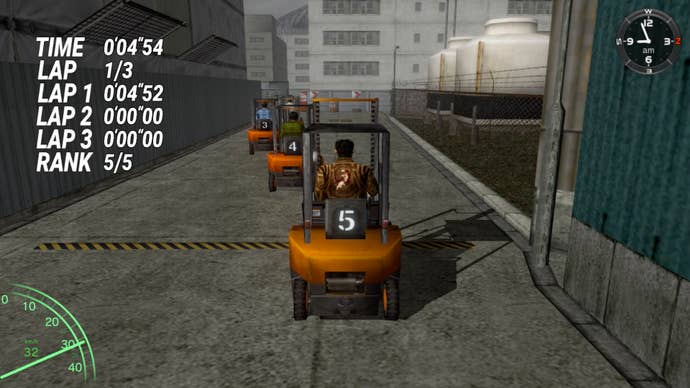
Patrice Désilets, director of Ancestors: The Humankind Odyssey, creative director of Assassin's Creed, Assassin's Creed 2, Assassin's Creed: Brotherhood
I remember that night, 2000, when it changed millenia. I remember we were at my place and we went on the web. And it took a while but we were like, 'This is the future! And in a few hours we'll be in 2000 and we're going on the web on a console!' But Shenmue was the game on that system that I played the most and that I remember.
Takashi Tokita, director of Chrono Trigger and Parasite Eve, lead game designer on Final Fantasy 6, creative producer of Oninaki
I love professional wrestling games, and on the Dreamcast there was a game where you could actually connect online through a phone line. That was the first game that you could do it for, a professional wrestling game. So it was quite impactful for me. [Editor's note: The game discussed here is Giant Gram 2000: All-Japan Pro Wrestling 3.]
Sam Barlow, director and writer of Her Story, Telling Lies
I never had a Dreamcast, but my brother did. He had a Dreamcast when I was still loving N64. So like, in the end days of the N64, where it was like Majora's Mask and I was still playing a lot of Perfect Dark, he was ringing me up and telling me, 'you got to play this game Shenmue, you've never seen anything like it. It's unbelievable.' And I remember, I was living in America and he was back in the U.K., and I visited for a weekend and I was with my then-girlfriend, now my wife. My brother was super excited to show me this game on the Dreamcast that was going to blow my mind. My wife's only memory of that weekend is just the hours spent listening to the main character say, "You seen some sailors by the docks?" or whatever the weird phrases he asks people. And she couldn't understand how incredibly cool it was to have this game with this village, with this simulated life, because she couldn't get past some of weird dialogue and questions.
So yeah, most of my memories of the Dreamcast are watching other people play it, or reading about things or being jealous of games that never came out. It was the guy who did the game D, I remember it was like an FMV, a pre-rendered CGI game. He introduced the concept of a virtual actor. So he created this female character model that was going to be the star of all his games, and he did a game on the Dreamcast which I think only came out in Japan. It was like a weird survival horror game set in the snowy mountains [with] all sorts of weird body horror. I watched tons of videos. So for me, my memories of Dreamcast were watching videos of weird games that never made it over here, and interesting things that never quite landed.
And my brother made me watch him play hours and hours of, what was the pirate RPG? Skies of Arcadia. Then he would try and make me play Chu Chu Rocket and I'd be like 'yeah, seems fine. Seems like a cute puzzle game.' And wasn't that like one of the first online games or something? It was way back when you had to get a special modem and plug it in. And there was a lot of effort involved in playing Chu Chu Rocket online. Which, again, sounded very exciting, but was slightly underwhelming in actuality. So yeah, that was my Dreamcast memories.
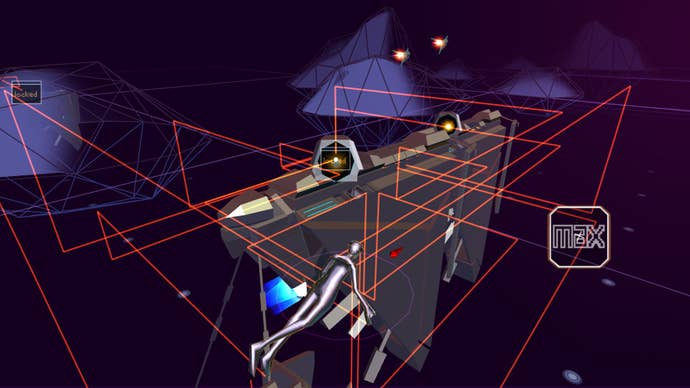
Matthew Seiji Burns, writer and designer of Eliza, writer and composer of Exapunks, Opus Magnum, Shenzhen I/O
Rez came out on PS2 as well, but it was better on the Dreamcast, as so many games were. So many games that were on Dreamcast were better on Dreamcast.
Brendon Chung, developer of Thirty Flights of Loving, Quadrilateral Cowboy
I didn't have a Dreamcast, but I did play a ton of Virtual On. The art, the feel, the extremely fresh control scheme-all incredible. Definitely one of the best in the big robots genre!
Virtual On had a unique twin-stick control scheme. To move in a direction, you pushed both sticks in the same direction. To turn, you would push one stick forward and the other stick backward. It's one of those control schemes that is a natural, perfect fit—yes, of course this giant robot is controlled by wiggling two sticks around.
Kaname Fujioka, executive director for Monster Hunter: World
I'm trying to think of the name... Jet Set Radio. I love Jet Set Radio.
Steve Gaynor, writer and designer of Gone Home, co-director of Tacoma
It's not an innovative choice, but my favorite Dreamcast game is Shenmue, for a few different reasons. I love the very "real-world," mundane setting of 1980s Tokyo. This approach to a game's setting and feel really hadn't been done before on Shenmue's scale. Being in the small part of the city where you start out has such a feeling of place and realness. It's transportive by being so understated. Shenmue was a direct influence on Fullbright's first game, Gone Home. I replayed Shenmue early on in making Gone Home, and I loved exploring Ryu's house at the beginning of the game. The feeling of being there, and the satisfaction of opening drawers and closets all through the house to see what's inside, and seeing all the little mundane details of the characters' living space right where they should be—that was huge for me.
I also love Shenmue because it led directly to the Yakuza series, which is another set of games that I absolutely adore. They're much bigger and flashier and more over-the-top, but you can see the Shenmue DNA that carried over into the original Yakuza, and then into the rest of the series and Judgment. It's wild the almost 20 year legacy Shenmue has had, and I'm grateful that such a strange and unique but small and self-contained thing was released all those years ago.
Ryutaro Sasaki, producer of Oninaki
I'm not sure if it was released outside of Japan, but it was called Giant Gram 2000. The basis of the game was like Virtua Fighter but it was just Virtua Fighter as like a professional wrestling game. And I believe that that was a really great game. And it was like high, like the quality of the game was really high as well.
Atsushi Hashimoto, director of I Am Setsuna, Lost Sphear, and Oninaki
Ikaruga. It's quite different than what we're talking about [with Giant Gram 2000], but yeah, that would be my favorite game. So you could switch between white and black, and it's a shooting game, and that's why I really like that. It's still pretty popular.
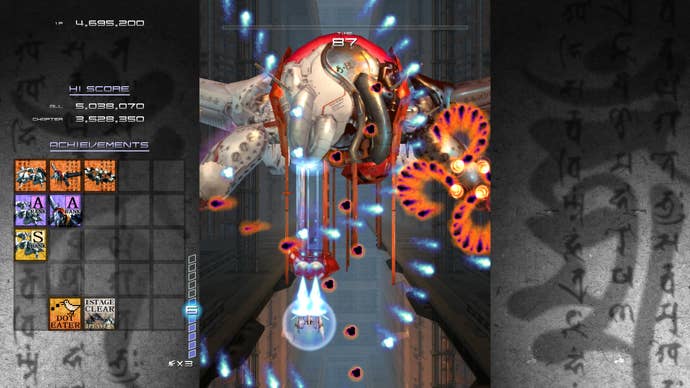
Greg Kasavin, designer and writer on Hades, Pyre, Transistor, Bastion
Oh man, I have a lot. I love the Dreamcast. It was great. It was a great game system. The one that jumped to mind—I don't know that this is actually my favorite favorite—but the one that instantly jumped to the top of my mind is a game called Ikaruga, which is a Treasures shoot 'em up.
Ikaruga was a game that, I think, is—and I don't say this lightly—from a design elegance standpoint, one of the most sublime games I've ever played. Just a work of stunning beauty from top to bottom, that incidentally is in the form of a space shoot 'em up—but it's just a mesmerizing game to me that I still come back to from time to [time]. Now it's available on Steam and Switch, and there was like a GameCube version and what have you, but my first experience with it was on the Dreamcast and I actually have a copy of that game that I keep near my desk, to absorb its spiritual energy by osmosis. Not that I work on anything even resembling that game, but yeah.
Drew McCoy, executive producer on Apex Legends
I know exactly what mine is—even though I'm pretty sure if I was to go back and play it, I'd be like, 'what was I thinking'—Super Magnetic Neo. It was a platformer where you're a kid made out of magnets, and you could switch your polarity and that's how you would jump. He would like stand on a positive platform, and then make yourself positive, and so you'd bounce away from it and there'd be like another platform with negative, and you keep yourself positive so you'd traverse. It's kinda like if you ever played 'Splosion Man, where you jumped by exploding yourself. It's like that. It's an interesting twist on travel mechanics, but I don't even know why I liked it. I think I just bought it at Funcoland for like 10 bucks and like, this is awesome.
Hiroyuki Miyazaki, Sega executive manager
It's a game that we only sold in Japan. When we were working on the Dreamcast, I actually created games for the Dreamcast. *gestures to an image of Derby Tsuku 2, a horse racing training simulator* I was the producer for that one. This title, after it was on the Dreamcast, we created it for the PlayStation up to Volume 5. I worked on those too. It's a really special place in my heart.
Xalavier Nelson Jr., developer on Hypnospace Outlaw
So my favorite Dreamcast game of all time is Star Wars [Episode 1]: Jedi Power Battles, and that isn't just because I'm trying to be contrarian and not say Shenmue or Crazy Taxi or something. It's because the Dreamcast was my first console as a kid. The very first one I played on, my very first experience with essentially the promise of a new generation.
If titles like Shenmue illustrate the promise to come and the forward thinking nature of the console itself, then Jedi Power Battles represents the confusion and pain of existence, really. I was a tiny little child coming to grasp with controls for the first time. I didn't know that save systems existed, or the block button existed, or anything really. I just wanted to be Obi Wan and slice droids, and the game seemed to actively discourage that. It is a maze of death and pain and confusing systems.
I've been doing research since you contacted me about this piece, and I still don't know why the lightsaber glows, or how to get there. All I know is that I've become, especially now that I'm a game developer, extremely interested in recursive systems and stories that look back onto themselves and so on. And the more I look at Star Wars: Jedi Power Battles, the more I can trace that back to this abstract, oddly well-rendered hellscape that the game transported me to where I have no save button.
According to the footage I've seen, I never got past the first stage. I didn't even get to the first boss, but I'd keep playing over and over and over again wondering who was this alien dude with the yellow lightsaber. I questioned how this entire thing worked and I could never figure it out. And if there's anything the Dreamcast was about, it was about the bewildering, painful future ahead of us accompanied by the images of things that we should have loved.
So I guess the reason I love Jedi Power Battles aside from the fact that it let me be a Jedi with the yellow lightsaber, who I have come to find out is actually a quite cool character in the canon—I think, I hope, I don't know his name or anything. I hope he doesn't turn out to be a space racist or something. The reason I love Star Wars: Jedi Power Battles is because it taught me my own mortality, and I think that's a valuable lesson for any child to learn at an early age.
It's an interesting experience playing a license game like Jedi Power Battles at the time because it serves to give something for the fandom, but when you aren't exactly a part of the fandom and you expect that a lot of younger players might be playing your game, why would you seek to hurt them with every single system and in combat encounter that you designed? I don't know, but I admire their bravery for doing it.
Star Wars: Jedi Power Battles and other licensed games like it get a bad rap for reusing assets, for simplistic systems, for teaching children mortality, among other things. And what I've come to, both as a developer and a journalist, I really appreciate the craft that inside of them. Because with inconsistent access to source material and often horrible time restrictions, they pull something competent and worthy for an audience that they believe that they could count on as being guaranteed sales hopefully. That, or they would be screwed.
Jedi Power Battles is one of the apex of those, of what seems to be one of those limited license titles that nonetheless tried to pull off something incredibly ambitious within the scope it was given. And, yeah, it would be very limited and hyperbolic statement to say that Star Wars: Jedi Power Battles was the original licensed game; and it was the progenitor of all that was to come. But it certainly was the progenitor of all that I would come to play, and appreciating the craft that can be found in something that teaches you that everyone dies and life is unfair will make you a better game developer. And here I am today.
Daisuke Sato, producer of Yakuza, Judgment
There was a time when Sega corporate wasn't doing so well, so instead of a Christmas bonus he got a Dreamcast. On this Dreamcast there was a game called Dabitsuku [also known as Derby Tsuku], which if you translate literally means "let's build a derby horse." So there's like soccer manager where you build up a soccer club, and it's basically the same but with a racing horse.
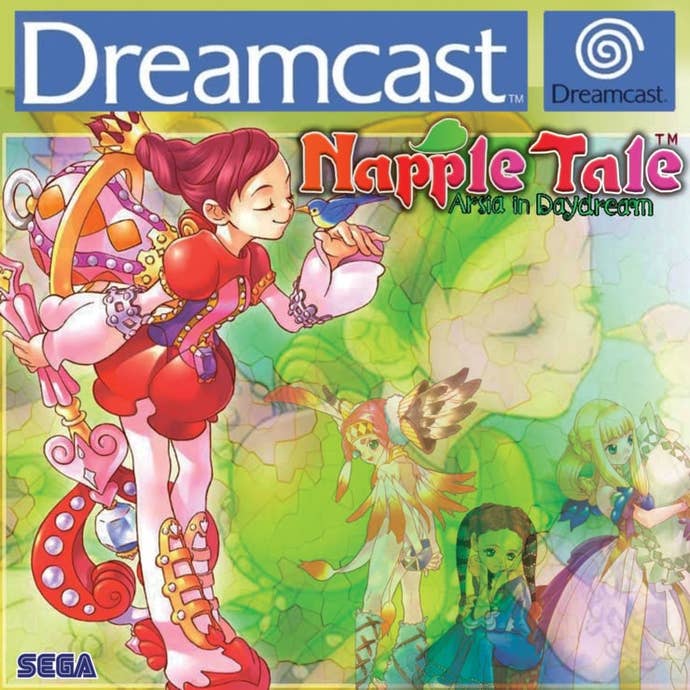
Sean Han Tani, developer on Anodyne 2, Even the Ocean
I actually didn't ever own or play a Dreamcast, [but] here's a game I've always found interesting and wanted to check out.
While I've never played [Napple Tale], with a soundtrack by Yoko Kanno and a mainly woman-led design team, I've always been interested in the way this game combines 2.5D platforming with some 3rd-person 3D light town-management. It has these fantastical, seasons-themed areas, and the stuff you find in the levels tie into building furniture and helping villagers in the central town. It's a thoughtful-sounding spin on traditional, stage-based platformers and it's shame it was never localized to English or other languages!
Yusuke Tomizawa, producer of Tales of Arise, God Eater series
D2. It's kind of a crazy game. You cannot see the last boss, because it’s totally dark. You need to battle with just sound. It's kind of like a nightmare, you know? And D2 is my personal time to play and explore in the snow field. I love this game.
Sean Velasco, designer of Shovel Knight
There are so many choices. The better-than-arcade beauty of Soulcalibur? Sonic Adventure in all its shiny launch day orca-fueled optimism? Jet Set Radio's too-cool aesthetic? Ambitious-but-flawed capsule-gazing in Shenmue? Long conversations bordering on friendship with Seaman? Real-ass expressions crossing the faces of characters in Skies of Arcadia? Rock solid 60 FPS Legacy of Kain: Soul Reaver? Street Fighter 3: 3rd Strike in all of its perfect glory? Ikaruga in all of its perfect glory? What a hot breeding ground of creativity the Dreamcast was. How could I choose just one?
